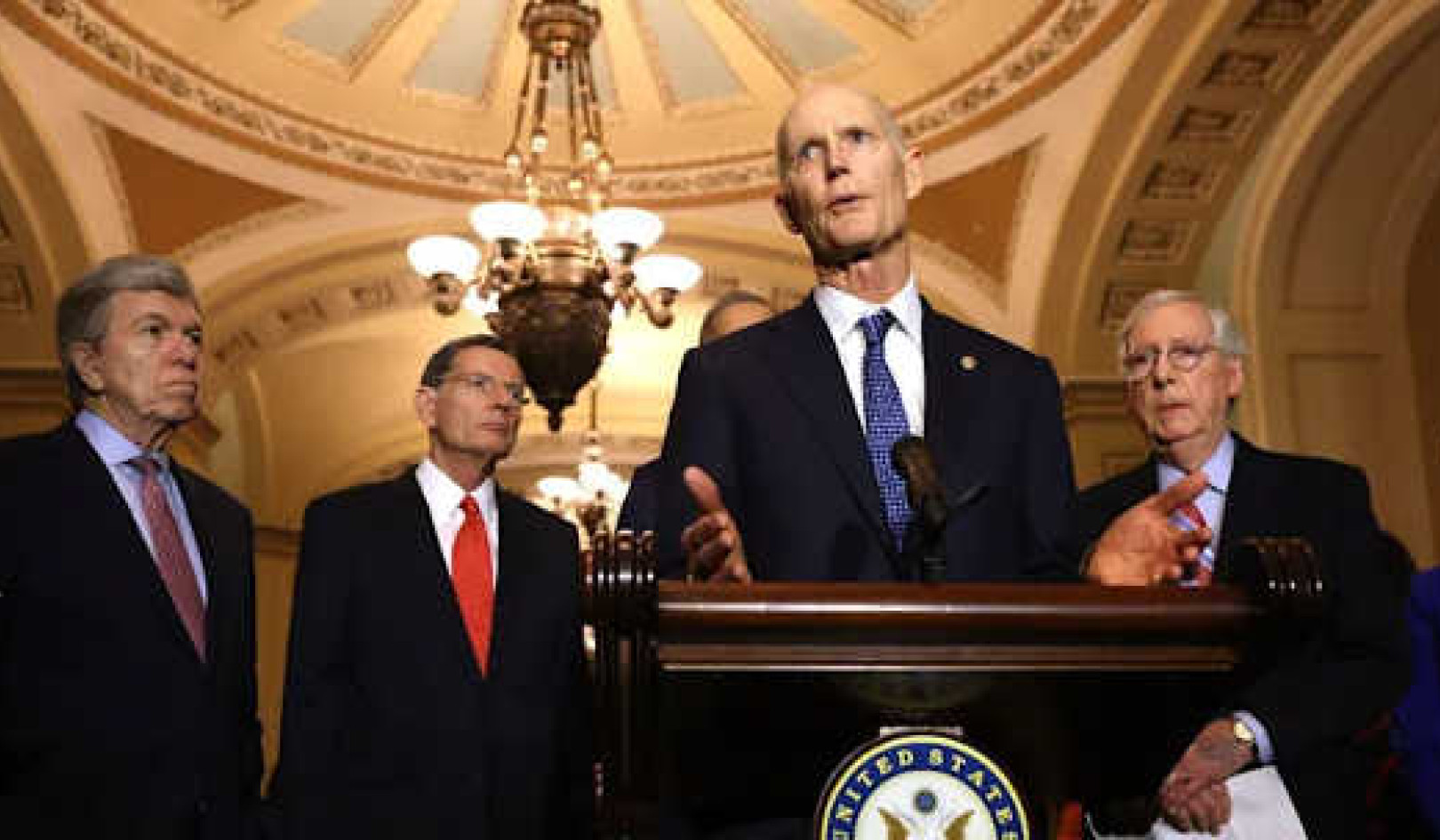
US president, Joe Biden, raised tariffs on Chinese-made goods sharply in May, hævder that the “Chinese government has cheated by pouring money into Chinese companies … hurting competitors who play by the rules”. The takster are 25% on steel and aluminium, 50% on semiconductors and solar panels, and 100% on electric vehicles.
Under Biden’s presidency the US has embarked on an ambitious strategy to revive American high-tech industries and become less reliant on foreign imports, especially from China. This strategy has included pumping massive subsidies into the renewables and semiconductor industries. The tariff hikes are clearly part of this strategy and shouldn’t come as a surprise to those who have followed US trade and industrial policy in recent years.
But the double standards of these policies, particularly the recent tariffs, need to be addressed. For years, Democratic and Republican administrations in the US have touted the virtues of free trade to the rest of the world, working towards establishing a multilateral trading system that limits the use of protectionist policies.
The formation of the World Trade Organization (WTO) is a great example of this. During the years of negotiations in the 1980s and 1990s that led to the formation of the WTO, a small group of powerful countries – led by the US and influenced by large corporations based in the US – used their power and influence to omskrive reglerne of international trade to their advantage.
The system they established was publicly marketed as a system of “fair play” in the global economy that would benefit all countries that took part in it. However, in reality, WTO rules clearly made it easier for US-based corporations to expand their dominance in the world economy. Limiting protectionism, especially in developing countries, has enabled US-based corporations to grow their control.
The income that US-based transnational corporations have collected from their foreign affiliates, measured as a share of their total worldwide net income, øget from 17% in 1977 to 49% in 2006. And in 2010, Walmart, one of the world’s largest retail companies, ranked as China’s seventh-largest trading partner, ahead of the UK.
Even today, when the scales have balanced themselves slightly more in favour of China, the headquarters of the world’s largest companies are highly concentrated in the US.
Dødelige konsekvenser
The US has also used the WTO framework to prop up the profits of US-based pharmaceutical companies, preventing lifesaving vaccines from reaching developing countries in the process. The pandemic provided the clearest example of this.
In early 2021, there was a stor debat between WTO member states about whether patents on COVID vaccines should be waived. WTO rules protect patents and copyrights globally under the guise of incentivising more innovation.
The irony with this rule is that it doesn’t support the free flow of technological knowledge, in some ways contradicting the mantra of free trade. But the rule is consistent with how the WTO works in practice, in that it serves to protect the interests of US-based corporations.
The way this works is simple. On paper, WTO rules seek to protect everyone’s intellectual property. But, because innovation is highly skewed globally, these rules give a massive advantage to large companies in wealthy countries who have superior research and development infrastructure and de-facto monopolies on intellectual property.
The argument for waiving the patents was that during a global pandemic, it would be inhumane and greedy to prevent developing countries from being able to access the best vaccine recipes.
What was the outcome of this debate? The US, along with a few more high-income countries, voted to block the waiver on vaccine patents. This prevented many poorer countries from gaining access to the vaccine recipes of companies such as Pfizer.
Having had access to the recipes early on could have saved thousands of lives in these countries, especially in those with decent vaccine manufacturing capacity such as India. In fact, forskning published in 2023 found that more than 50% of COVID deaths in low and middle-income countries could have been avoided if people had the same access to vaccines as wealthy states.
By hiking tariffs on Chinese-made goods, the US is once again trying to bend and change the rules of international trade to work in its favour. After working tirelessly to establish a system of free trade, the US is now making an 180-degree turn and has imposed some of the steepest tariffs we’ve seen by a major economy in recent years.
US trade policy has always been about protecting the interest of US-based corporations, so this should not come as a surprise. But the hypocrisy of Biden’s administration needs to be called out.
In the rules-based multilateral trading system of today, China has not entirely played by the rules either. But China hasn’t come close to trying to change the rules to work in their favour as much as the US. So, who’s really cheating here?![]()
Jostein Hauge, Assistant Professor in Development Studies, University of Cambridge
Denne artikel er genudgivet fra The Conversation under en Creative Commons-licens. Læs oprindelige artikel.
Anbefalede bøger:
Capital i det enogtyvende århundrede
af Thomas Piketty. (Oversat af Arthur Goldhammer)
 In Kapital i det tyvende århundrede, Thomas Piketty analyserer en unik samling af data fra tyve lande, der strækker sig så langt tilbage som det attende århundrede, for at afdække vigtige økonomiske og sociale mønstre. Men økonomiske tendenser er ikke Guds handlinger. Politisk handling har dæmpet farlige uligheder i fortiden, siger Thomas Piketty, og kan gøre det igen. Et arbejde med ekstraordinær ambition, originalitet og strenghed, Capital i det enogtyvende århundrede omlægger vores forståelse af den økonomiske historie og konfronterer os med nøgterne lektioner for i dag. Hans fund vil transformere debatten og sætte dagsordenen for den næste generation af tanker om rigdom og ulighed.
In Kapital i det tyvende århundrede, Thomas Piketty analyserer en unik samling af data fra tyve lande, der strækker sig så langt tilbage som det attende århundrede, for at afdække vigtige økonomiske og sociale mønstre. Men økonomiske tendenser er ikke Guds handlinger. Politisk handling har dæmpet farlige uligheder i fortiden, siger Thomas Piketty, og kan gøre det igen. Et arbejde med ekstraordinær ambition, originalitet og strenghed, Capital i det enogtyvende århundrede omlægger vores forståelse af den økonomiske historie og konfronterer os med nøgterne lektioner for i dag. Hans fund vil transformere debatten og sætte dagsordenen for den næste generation af tanker om rigdom og ulighed.
Klik her for mere info og / eller for at bestille denne bog på Amazon.
Naturens formue: Hvordan forretning og samfund trives ved at investere i naturen
af Mark R. Tercek og Jonathan S. Adams.
 Hvad er naturen værd? Svaret på dette spørgsmål - som traditionelt er blevet indrammet i miljømæssige termer - revolutionerer den måde, vi driver forretning på. I Nature's Fortune, Mark Tercek, administrerende direktør for The Nature Conservancy og den tidligere investeringsbank, og videnskabsforfatter Jonathan Adams hævder, at naturen ikke kun er fundamentet for menneskeligt velvære, men også den smarteste kommercielle investering, som enhver virksomhed eller regering kan gøre. Skove, oversvømmelsespladser og østersrev ses ofte simpelt hen som råmaterialer eller som hindringer, der skal ryddes i fremskridtens navn, er faktisk lige så vigtige for vores fremtidige velstand som teknologi eller lov eller forretningsinnovation. Nature's Fortune tilbyder en vigtig guide til verdens økonomiske - og miljømæssige - velvære.
Hvad er naturen værd? Svaret på dette spørgsmål - som traditionelt er blevet indrammet i miljømæssige termer - revolutionerer den måde, vi driver forretning på. I Nature's Fortune, Mark Tercek, administrerende direktør for The Nature Conservancy og den tidligere investeringsbank, og videnskabsforfatter Jonathan Adams hævder, at naturen ikke kun er fundamentet for menneskeligt velvære, men også den smarteste kommercielle investering, som enhver virksomhed eller regering kan gøre. Skove, oversvømmelsespladser og østersrev ses ofte simpelt hen som råmaterialer eller som hindringer, der skal ryddes i fremskridtens navn, er faktisk lige så vigtige for vores fremtidige velstand som teknologi eller lov eller forretningsinnovation. Nature's Fortune tilbyder en vigtig guide til verdens økonomiske - og miljømæssige - velvære.
Klik her for mere info og / eller for at bestille denne bog på Amazon.
Beyond Outrage: Hvad er gået galt med vores økonomi og vores demokrati, og hvordan man løser det -- af Robert B. Reich
 I denne rettidige bog argumenterer Robert B. Reich for, at der ikke sker noget godt i Washington, medmindre borgerne er energiske og organiserede for at sikre, at Washington handler i det offentlige gode. Det første skridt er at se det store billede. Beyond Outrage forbinder prikkerne og viser, hvorfor den stigende andel af indkomst og formue, der går til toppen, har hæmmet job og vækst for alle andre og undergraver vores demokrati; fik amerikanerne til at blive mere og mere kyniske med hensyn til det offentlige liv; og vendte mange amerikanere mod hinanden. Han forklarer også, hvorfor forslagene fra "regressiv ret" er død forkerte og giver en klar køreplan for, hvad der skal gøres i stedet. Her er en handlingsplan for alle, der bekymrer sig om Amerikas fremtid.
I denne rettidige bog argumenterer Robert B. Reich for, at der ikke sker noget godt i Washington, medmindre borgerne er energiske og organiserede for at sikre, at Washington handler i det offentlige gode. Det første skridt er at se det store billede. Beyond Outrage forbinder prikkerne og viser, hvorfor den stigende andel af indkomst og formue, der går til toppen, har hæmmet job og vækst for alle andre og undergraver vores demokrati; fik amerikanerne til at blive mere og mere kyniske med hensyn til det offentlige liv; og vendte mange amerikanere mod hinanden. Han forklarer også, hvorfor forslagene fra "regressiv ret" er død forkerte og giver en klar køreplan for, hvad der skal gøres i stedet. Her er en handlingsplan for alle, der bekymrer sig om Amerikas fremtid.
Klik her for mere info eller for at bestille denne bog på Amazon.
Dette ændrer alt: Besæt Wall Street og 99% bevægelsen
af Sarah van Gelder og personale fra YES! Magasin.
 Dette ændrer alt viser, hvordan Occupy-bevægelsen skifter den måde, folk ser på sig selv og på verdenen, den slags samfund, de mener er mulig, og deres egen involvering i at skabe et samfund, der fungerer for 99% i stedet for kun 1%. Forsøg på at tømme dette decentrale, hurtigt udviklende bevægelsesløb har ført til forvirring og misforståelse. I dette bind redaktionerne af JA! Magasin samle stemmer indefra og uden for protesterne for at formidle de spørgsmål, muligheder og personligheder, der er forbundet med Occupy Wall Street-bevægelsen. Denne bog indeholder bidrag fra Naomi Klein, David Korten, Rebecca Solnit, Ralph Nader og andre samt Occupy-aktivister, der var der fra starten.
Dette ændrer alt viser, hvordan Occupy-bevægelsen skifter den måde, folk ser på sig selv og på verdenen, den slags samfund, de mener er mulig, og deres egen involvering i at skabe et samfund, der fungerer for 99% i stedet for kun 1%. Forsøg på at tømme dette decentrale, hurtigt udviklende bevægelsesløb har ført til forvirring og misforståelse. I dette bind redaktionerne af JA! Magasin samle stemmer indefra og uden for protesterne for at formidle de spørgsmål, muligheder og personligheder, der er forbundet med Occupy Wall Street-bevægelsen. Denne bog indeholder bidrag fra Naomi Klein, David Korten, Rebecca Solnit, Ralph Nader og andre samt Occupy-aktivister, der var der fra starten.
Klik her for mere info og / eller for at bestille denne bog på Amazon.
























